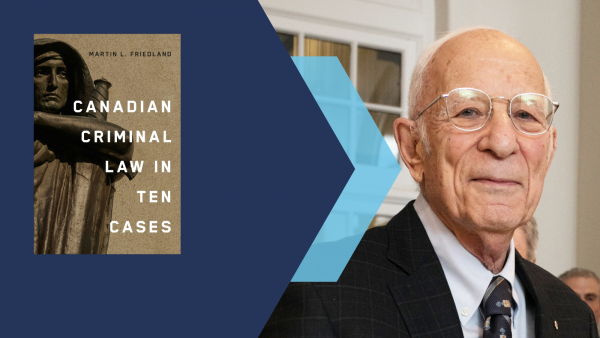
Photo by Dewy Chang
Martin L. Friedland (LLB 1958) believes storytelling can provide us with a better understanding of our legal system. Friedland, a University Professor and Dean Emeritus of the University of Toronto’s Faculty of Law, is a prolific author whose past works include award-winning true crime books, the biography of U of T’s first law school dean, W.P.M. Kennedy, and the history of the University of Toronto. He is a Companion of the Order of Canada and the winner of the Molson Prize for "outstanding achievements and exceptional contribution to the enrichment of the cultural life of Canada."
Storytelling came fairly late in his career. In the early 1980s he was working on a project – using traditional scholarly techniques – tracing the development of criminal law in Canada.
“On a sabbatical in the early 1980s,” he writes, “I was working on a chapter on the codification of the criminal law. I looked at two draft criminal codes that had been produced in England in the 19th century, one written by the well-known jurist, James Fitzjames Stephen, and another – and a much better code – written by a British judge, R. S. Wright.”
This chapter became an article published in the Oxford Journal of Legal Studies, that told the story of the two codes and the interesting relationship between Stephen and Wright. “My writing style had changed,” says Friedland. He didn’t disclose to the reader at the outset what happened to the codes. This kept the reader interested in continuing to read the article.
His latest book, Canadian Criminal Law in Ten Cases (University of Toronto Press, 2024), adds a similar measure of drama by describing the participants, the political, social, and economic conditions of the time, and other factors not normally discussed in a court’s decision, making the book accessible to anyone with an interest in criminal law.
The University of Toronto Press website states:
"Canadian Criminal Law in Ten Cases explores the development of criminal justice in Canada through an in-depth examination of ten significant criminal cases. Martin L. Friedland draws on cases that went to the Supreme Court of Canada or the Privy Council, including well-known cases such as those of Louis Riel, Steven Truscott, Henry Morgentaler, and Jamie Gladue. The book addresses such issues as wrongful convictions, the enforcement of morality, Indigenous experiences with criminal law, bail and trial delay, and the impact of the 1982 Charter of Rights and Freedoms on the criminal justice system. Friedland describes in a masterful way the factual background of each case and the political, social, and economic conditions of the time. Each character – the accused, judges, and counsel – is described in detail, as are the relevant laws and procedures. Friedland includes recommendations on how the criminal justice system can be improved, such as by creating a new federal commission devoted solely to criminal justice and by the enactment by Parliament of enhanced codes of evidence and criminal law and procedure. Canadian Criminal Law in Ten Cases is an indispensable guide to understanding the criminal justice system for lawyers, students, and anyone interested in criminal law and the administration of criminal justice."
The book has been highly praised. The back-cover quotes state:
“The skilful use of ten leading criminal law decisions by one of this country’s pre-eminent criminal law scholars culminates in a masterful overview of Canada’s criminal justice system.” — The Honourable Michael J. Moldaver (LLB 1971, Hon. LLD 2019), former Justice of the Supreme Court of Canada
“It’s a great read, both for lawyers and for the general public, and makes the case, loud and clear and once again, for the setting up of a Law Reform Commission similar to the one abolished in 1992, entirely devoted to the analysis and reform of criminal law, procedure, and evidence.” — The Honourable Louise Arbour, former Justice of the Supreme Court of Canada and United Nations High Commissioner for Human Rights
“A lively, learned, and at times very personal journey into the complex, dynamic life of Canadian criminal law. Through Friedland’s skilful storytelling we learn not only about a range of fascinating legal cases – some familiar, others more obscure – but also about the people, tensions, and challenges that have made the criminal law such an important part of our political and social lives.” — Benjamin Berger, Professor of Law, Osgoode Hall Law School.
Join us for our next webinar on Canadian Criminal Law in Ten Cases
Join Friedland and Distinguished Jurist-in-Residence and Dean Emeritus, the Hon. Robert J. Sharpe (LLB 1970), for the discussion on September 26 at 12:30 p.m.

